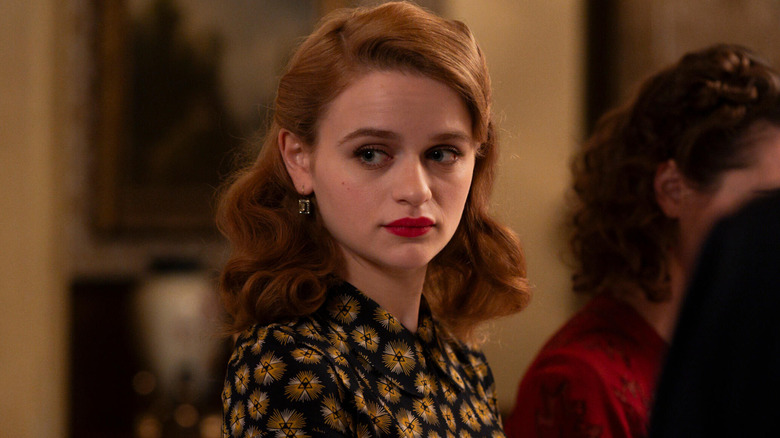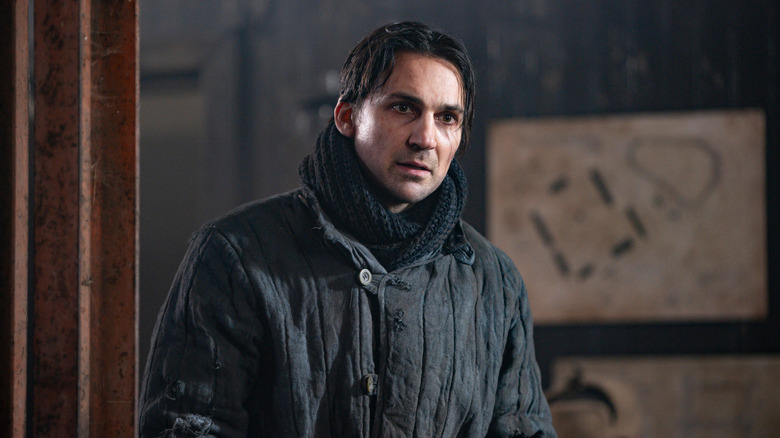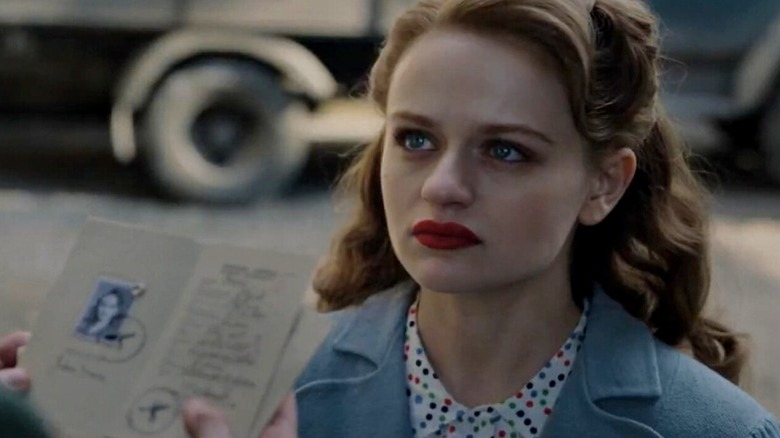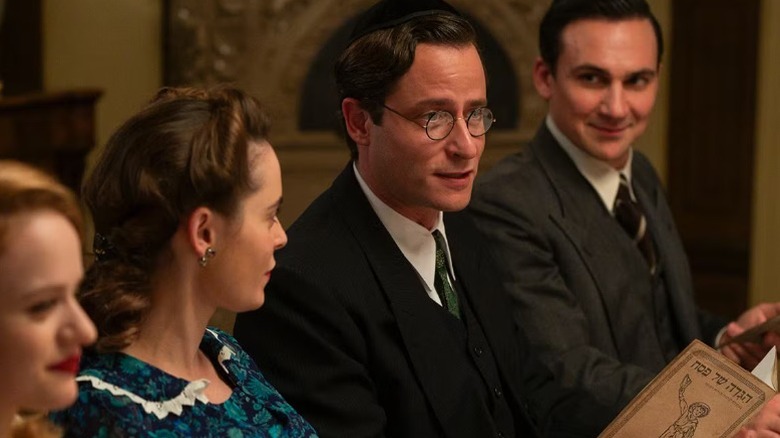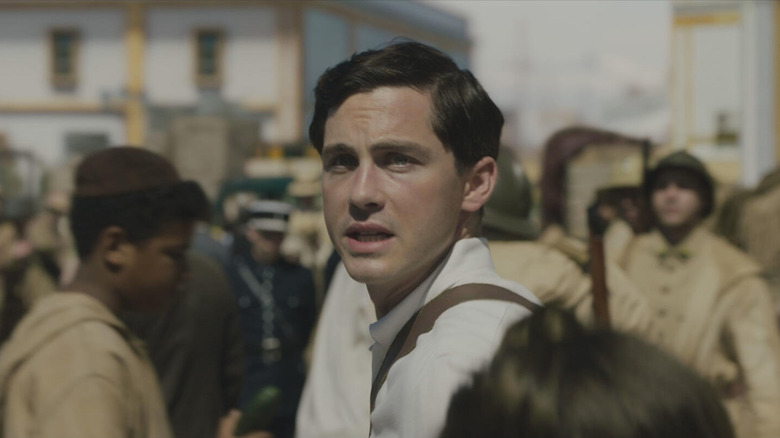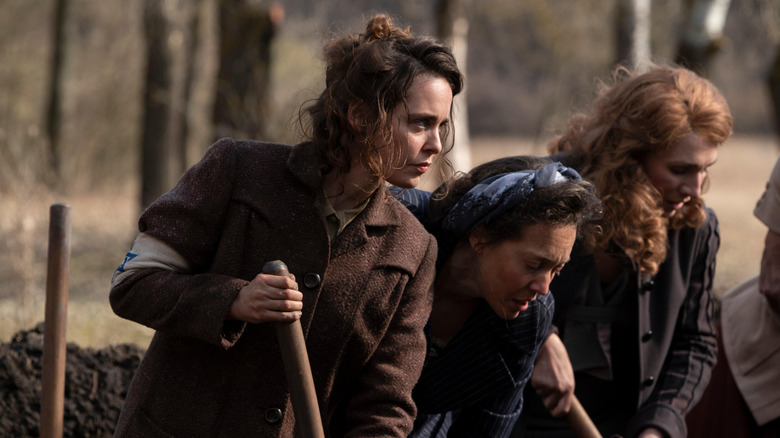Is We Were The Lucky Ones Based On A True Story?
As one of the most important events of the 20th century, World War II is ripe for stories across all kinds of mediums. From video games to novels, writers have told tales set in this era, and Hollywood is no different. Many acclaimed World War II movies and television shows have depicted the conflict from the different perspectives of those involved.
"We Were the Lucky Ones" is one of the most recent examples, following the Kurc family, a family of Polish Jews who find themselves caught up in the tragic and horrifying events of World War II as the leader of the Third Reich begins his campaign across Europe. Airing on Hulu, it is a gut-wrenching and poignant series that delves into how the persecution of the Jewish people affected every aspect of their personal lives and destroyed entire families.
As it takes place during a very real historical event, many people might simply assume that everything it depicts is accurate and based on what really happened during this period in history. Here, we examine whether "We Were the Lucky Ones" is actually based on a true story or whether it's not quite as factual as you might believe.
The series is based on a book
"We Were the Lucky Ones" is actually an adaptation of a novel by author Georgia Hunter. Released in 2017, the book spent a number of weeks on the New York Times Best Seller list, where it reached the number four spot on February 11, 2018. The idea for the novel took root in 2008 when Hunter began researching her own family history. After traveling to France, Brazil, and various locations across the United States, she found herself able to start to understand what her relatives had gone through during the Second World War.
Speaking with Book Club Babble, Hunter explained that she chose to write "We Were the Lucky Ones" as historical fiction rather than as non-fiction in an attempt to make the story more engaging. This included telling the narrative in the present tense and also adding emotive elements that would not work in a more fact-based text. "These decisions, I hoped, would make the story feel less like a lesson in history, and more visceral, more relevant to today's reader—and perhaps even bring the story even closer to the truth," she explained.
The series is based on a true story
If "We Were the Lucky Ones" feels visceral and real, that might be because the novel is based on a true story. Author Georgia Hunter took inspiration from her own family history when developing the original novel. The Kurc family depicted in the show is actually her real-life great-grandparents and their children.
Upon learning that some of her family had survived the Holocaust, Hunter began examining the lives of her ancestors and discovered that an entire group of them had managed to survive living through the deadly moment in history. However, her original intent was not to create a novel at all. "I went into this particular project as a family historian, not really as an author," Hunter recalled in an interview with People. "I had never written a book before, so I set out in 2008 to unearth and record the family story."
Hunter traveled all around the world to investigate her family's history and managed to assemble a treasure trove of material such as diaries, photographs, official documents, and even fake IDs. Using these discoveries, along with the stories she was told by her surviving relatives, the author was able to piece together the chain of events that led to the Kurc family's reunion after the war.
The show has an important new opening scene
Even the highest-grossing book adaptations and successful television projects based on novels aren't entirely faithful to the source material. It's simply not possible to include every single detail from a book in an on-screen adaptation, and the expectations of audiences and the limitations of the medium often mean some things have to be changed to ensure the story remains engaging in a different medium. So it's not a massive surprise to learn that there are some significant differences between the television and novel versions of "We Were the Lucky Ones."
One important departure the show makes from the novel is that the action begins a year earlier, in 1938, rather than in 1939. In an interview with Screen Rant, author Georgia Hunter, who also had input on the direction of the show as a creative consultant, explained that this was so that the audience could fully understand what life was like for her characters. "I think it was really important to set the stage for audiences to meet this family," said Hunter. "It is a true family, a true ensemble of a piece with the five siblings and the parents and a young baby born along the way."
There are other differences between the book and series
Another change made in the transition from novel to show is an alteration to the story's overall structure. The novel is a true ensemble piece, with chapters alternating between different characters and perspectives like George R. R. Martin's "A Song of Ice and Fire" novels. The Hulu series still includes all these figures, but largely focuses on the trials and tribulations of Addy and Halina, played by Logan Lerman and Joey King, respectively. As they've been given greater attention and a larger role, some events that happen to their relatives in the book happen instead to Lerman and King's characters in the show. Halina's relationship with Adam (Sam Woolf) is also far more strained, and the pair are not an established couple like they are in the novel.
Meanwhile, Genek (Henry Lloyd-Hughes) is depicted as standing up to the commander of the prison labor camp where he and his wife are kept. There's another love drama between Isaac, played by Ido Samuel, and Hadas Yaron's Mila when her husband goes missing and is presumed dead. Eva Feiler's character, Bella, experiences a different journey to Lvov, Poland, where she plans to reunite with her boyfriend. While she takes this difficult trip alone in the source material, in the show, Helena accompanies Bella to provide support and help keep her safe.
How accurate is the television show?
Although "We Were the Lucky Ones" is essentially a faithful adaptation of the original novel, it's a different question to consider whether it's also historically accurate. In her Book Club Babble interview, Georgia Hunter admitted that she sometimes didn't stick to being completely honest with exactly how things actually happened, choosing instead to make narrative decisions based on what worked for her story. "I decided in the end to allow myself the creative license to fictionalize it," Hunter said. "To add those human, emotional details I wasn't able to uncover in my research, such as what my characters were thinking and saying and feeling."
Describing her process on Penguin Random House's website, Hunter explained that this was also done to bridge the narrative when her research was unable to uncover exactly what had happened at certain moments. However, she was careful to try and keep everything as historically accurate as possible, only including scenes that were appropriate for the time and place. "Now and then when I stumbled across a gap, I allowed myself the creative license to fill it in," she said, "but only if I could answer yes with confidence to the question 'is it feasible that this could have happened?'"
